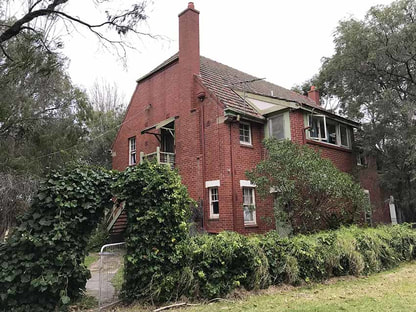 The former St Paul's Boys Home, Newhaven. Photos: Sam Brady
The former St Paul's Boys Home, Newhaven. Photos: Sam Brady RECENTLY I visited the abandoned St Paul’s Boys’ Home at Newhaven. I was amazed at the beauty of the Romanesque buildings and chapel. No problem gaining open access. Doors and windows smashed wide open, graffiti, filth, beautiful timber fittings pilfered. Just appalling. I had to keep reminding myself these openly accessible buildings are listed by the National Trust and on the Victorian Heritage Database.
On the contrary, the investors may well be waiting for squatters to trash or burn them to the ground, or a meteorite to fall from the sky, or a wayward bulldozer to stray off course. Is intentional demise a lawful investor strategy for a building the community values and wishes preserved?
Which government (local, state, federal) is supposed to enforce the protection and preservation of “listed” buildings? If the answer is “none”, then why is this so? If there are regulations for such things, why are they being wilfully ignored and unenforced by our authorities?
At a broader level, Chinese investors now own three farms that encircle the town of Tenby Point. Surely, it is not mere coincidence? Two of these farms have been virtually decommissioned, and mostly sit idle. In a similar manner to the Boys Home in Newhaven. Too early to say what will happen to the third farm in Tenby Point, which has been recently purchased. Chinese investors have also bought the old prison farm on French Island. Thankfully, they are planning to redevelop it.
I have nothing against the Chinese except for their government. Many of my immediate family, including my own children, are married to Asians. Other than politically, I am happily integrated into the Chinese Millennium. But Chinese land-banking of Australian farmland is another thing altogether. Particularly as ownership can involve some disclosed or undisclosed level of Chinese government ownership. Moreover, its government is active in extending its political tentacles to the Chinese diaspora in Australia. It has ways and means of exerting control, and is not shy to do so.
The potential risk is that the Chinese government directly or indirectly controls the destiny of Australian farmland. Just as they do elsewhere in the world. Presumably, they will do so in their interests, not ours. This is a matter of national more so than local interest, but it is not being adequately addressed in either Canberra or Spring Street.
The Chinese people are not permitted to purchase land in their own country. They must instead take out long term leases. Foreigners are not permitted to purchase land or businesses in China. The maximum foreign equity in Chinese businesses is 49 per cent.
By comparison, Australia is overly generous. There is a very strong argument to limit foreign ownership of productive Australian farmland to 49 per cent, or to apply long-term leaseholds similar to those applying in the foreigner’s home country. In a sense, a bilateral, non-discriminatory policy.
More generally, there should be strong disincentives to land banking, where otherwise good farmland is intentionally taken out of production. For foreigners at least, this could take the form of an additional land tax on properties relating to stocking rates or productivity. It could also apply to non-agricultural properties such as the Newhaven Boys Home. There is no community benefit in foreign investors just sitting on land, refusing to either secure listed buildings or sell their property.
Similarly, it is not in the national interest for cashed up speculators to take good farmland out of meaningful production, and use that farmland as money in the bank rather than a means of production. This particularly applies to foreign speculators who have no great incentive to expedite development, and are otherwise voluntary or involuntary servants of a foreign nation hostile to our values and an increasing threat to our sovereignty.
When it comes to land, Australia needs to take its cue from China. Adopt thoughtful long-term strategies that operate in both local and national interest.
A Landata search reveals Phillip Island International Pty Ltd bought the former St Paul’s Boys Home from The Knox School in January 2016. The company was registered just two months earlier and is based in Mitcham.
The Post asked Bass Coast Council who was responsible for protecting the heritage-listed buildings. The council’s acting manager of strategy and growth, Noel Creed, responded:
“The Bass Coast Planning Scheme protects the Newhaven Boys Home, at 54-61 Forrest Avenue, Newhaven, through the Heritage Overlay. The overlay triggers a planning permit requirement for most buildings works and demolitions, ensuring that the heritage values are considered as part of the planning permit application process.
“The buildings are also listed by the National Trust of Australia, which is not a statutory listing and does not provide further protections for the buildings.”